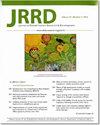Prevalence and correlates of painful conditions and multimorbidity in national sample of overweight/obese Veterans.
Q Medicine
Journal of Rehabilitation Research and Development
Pub Date : 2016-01-01
DOI:10.1682/JRRD.2014.10.0251
引用次数: 17
Abstract
Chronic pain and overweight/obesity are prevalent public health concerns and occur at particularly high rates among Veterans. This study examined the prevalence and correlates of two common painful conditions (back pain and arthritis/joint pain) among overweight/obese Veterans in Veterans Health Administration (VHA) care. Participants (N = 45,477) completed the MOVE!23, a survey intended to tailor treatment for Veterans in VHA's MOVE! weight-management program. Overall, 72% of the sample reported painful conditions, with 10% reporting back pain, 26% reporting arthritis/joint pain, and 35% reporting both. We used multinomial logistic regression with "no pain" as the reference category to examine the association between painful conditions and participant characteristics. After multivariable adjustment, female Veterans had higher odds of reporting arthritis/joint pain and combined back and arthritis/joint pain than no pain. Participants with higher body mass index had higher odds of reporting arthritis/joint pain and both back and arthritis/joint pain. The likelihood of painful conditions was higher in Veterans with comorbidities (hypertension, hyperlipidemia, lung disease, depression, anxiety, or posttraumatic stress disorder) and generally increased with the number of comorbidities reported (i.e., 5 or more). Overweight/obese Veterans frequently report painful conditions and, among those with pain, often have multiple comorbidities. These factors may increase the complexity of clinical management and necessitate refinements to weight-management programs.全国超重/肥胖退伍军人样本中疼痛状况和多病的患病率及其相关因素
慢性疼痛和超重/肥胖是普遍存在的公共健康问题,在退伍军人中发病率特别高。本研究调查了退伍军人健康管理局(VHA)护理的超重/肥胖退伍军人中两种常见疼痛状况(背部疼痛和关节炎/关节疼痛)的患病率及其相关性。参与者(N = 45,477)完成MOVE!23,一项旨在为VHA的MOVE!减肥计划。总体而言,72%的样本报告疼痛状况,10%报告背部疼痛,26%报告关节炎/关节疼痛,35%报告两者兼而有之。我们使用多项逻辑回归,以“无疼痛”作为参考类别来检验疼痛状况与参与者特征之间的关系。在多变量调整后,女性退伍军人报告关节炎/关节疼痛和合并背部和关节炎/关节疼痛的几率高于没有疼痛的几率。身体质量指数较高的参与者报告关节炎/关节疼痛以及背部和关节炎/关节疼痛的几率更高。有合并症(高血压、高脂血症、肺病、抑郁、焦虑或创伤后应激障碍)的退伍军人出现疼痛状况的可能性更高,并且通常随着合并症(即5种或更多)的报告数量而增加。超重/肥胖退伍军人经常报告疼痛状况,并且在那些疼痛的人中,通常有多种合并症。这些因素可能会增加临床管理的复杂性,需要改进体重管理方案。
本文章由计算机程序翻译,如有差异,请以英文原文为准。
求助全文
约1分钟内获得全文
求助全文

 求助内容:
求助内容: 应助结果提醒方式:
应助结果提醒方式:


